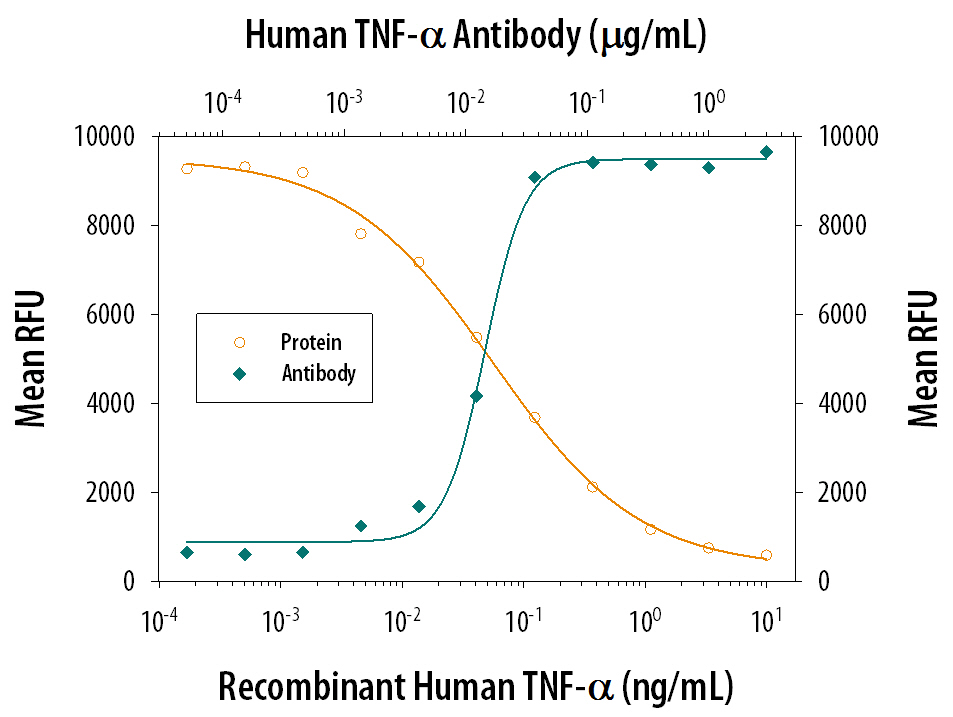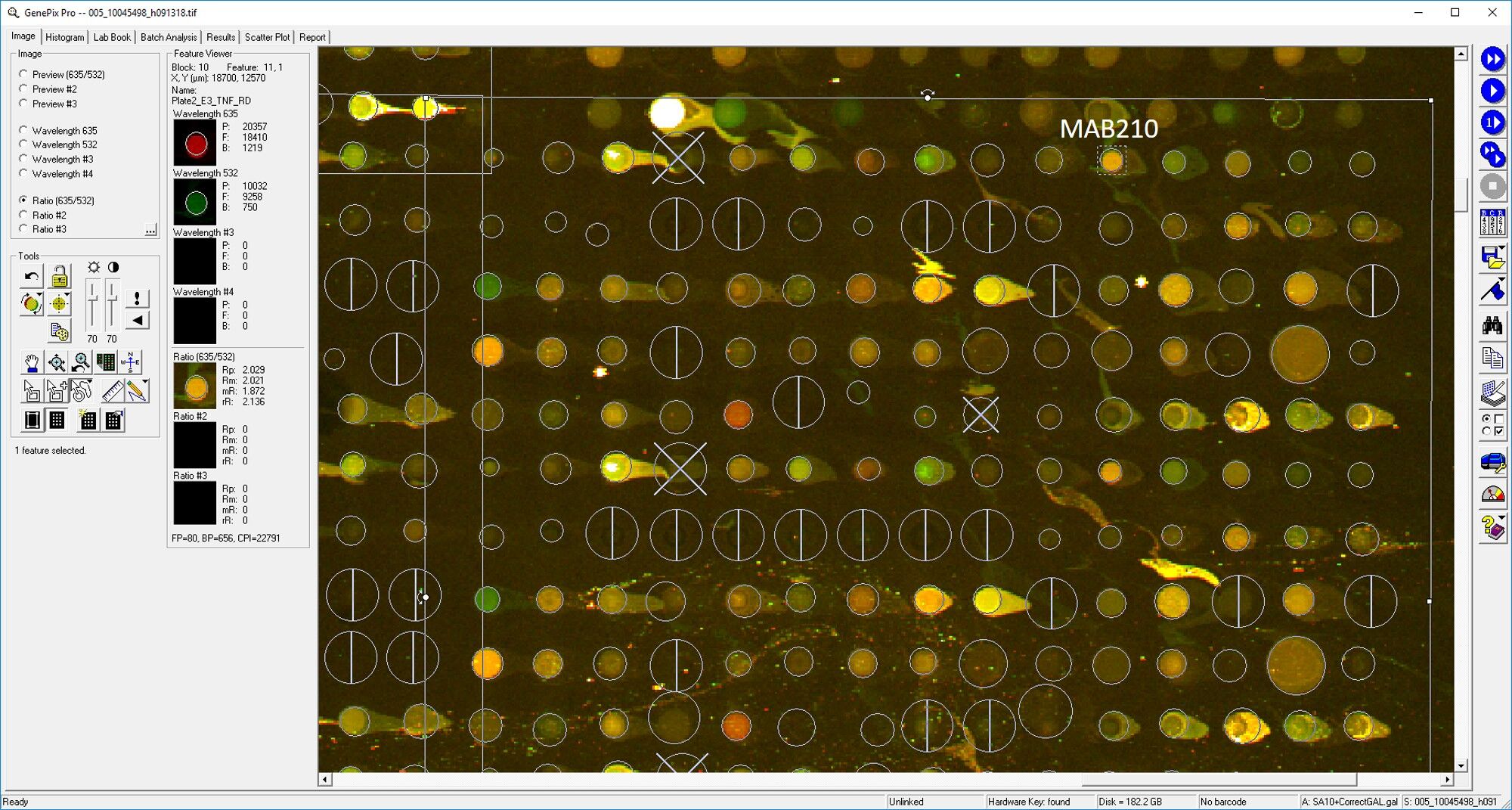Human TNF-alpha Antibody Summary
Applications
Please Note: Optimal dilutions should be determined by each laboratory for each application. General Protocols are available in the Technical Information section on our website.
Scientific Data
 View Larger
View Larger
Cytotoxicity Induced by TNF‑ alpha and Neutralization by Human TNF‑ alpha Antibody. Recombinant Human TNF-a (Catalog # 210-TA) induces cytotoxicity in the the L-929 mouse fibroblast cell line in a dose-dependent manner (orange line). Cytotoxicity elicited by Recombinant Human TNF-a (0.75 ng/mL) is neutralized (green line) by increasing concentrations of Mouse Anti-Human TNF-a Monoclonal Antibody (Catalog # MAB210). The ND50 is typically 0.01-0.06 µg/mL in the presence of the metabolic inhibitor actinomycin D (1 µg/mL).
Reconstitution Calculator
Preparation and Storage
- 12 months from date of receipt, -20 to -70 degreesC as supplied. 1 month, 2 to 8 degreesC under sterile conditions after reconstitution. 6 months, -20 to -70 degreesC under sterile conditions after reconstitution.
Background: TNF-alpha
Tumor necrosis factor alpha (TNF-alpha, TNF- alpha, TNFA ), also known as Cachectin and TNFSF2, is the prototypic ligand of the TNF superfamily. It is a pleiotropic molecule that plays a central role in inflammation, immune system development, apoptosis, and lipid metabolism. TNF- is produced by several lymphoid cells as well as by astrocytes, endothelial cells, and smooth muscle cells. Human TNF-alpha consisits of a 35 amino acid (aa) cytoplasmic domain, a 21 aa transmembrane segment, and a 177 aa extracellular domain (ECD). Within the ECD, human TNF-alpha shares 97% aa sequence identity with rhesus and 71%-92% with bovine, canine, cotton rat, equine, feline, mouse, porcine, and rat TNF-alpha. TNF-alpha is produced by a wide variety of immune, epithelial, endothelial, and tumor cells. TNF-alpha is assembled intracellularly to form a noncovalently linked homotrimer which is expressed on the cell surface. Cell surface TNF-alpha can induce the lysis of neighboring tumor cells and virus infected cells, and it can generate its own downstream cell signaling following ligation by soluble TNFR I. Shedding of membrane bound TNF-alpha by TACE/ADAM17 releases the bioactive cytokine, a 55 kDa molecular weight soluble trimer of the TNF-alpha extracellular domain. TNF-alpha binds the ubiquitous 55-60 kDa TNF RI and the hematopoietic cell-restricted 80 kDa TNF RII, both of which are also expressed as homotrimers present on virtually all cell types. Both type I and type II receptors bind TNF-alpha with comparable affinity, although only TNF RI contains a cytoplasmic death domain which triggers the activation of apoptosis. Soluble forms of both types of receptors are released and can neutralize the biological activity of TNF-alpha.
Product Datasheets
Citations for Human TNF-alpha Antibody
R&D Systems personnel manually curate a database that contains references using R&D Systems products. The data collected includes not only links to publications in PubMed, but also provides information about sample types, species, and experimental conditions.
16
Citations: Showing 1 - 10
Filter your results:
Filter by:
-
Targeting hypoxia-induced tumor stemness by activating pathogen-induced stem cell niche defense.
Authors: Bhuyan S, Pal B, Pathak L, Saikia P, Mitra S, Gayan S, Mokhtari R, Li H, Ramana C, Baishya D, Das B
Front Immunol, 2022-09-29;13(0):933329.
Species: Complex Species Category
Sample Types: Whole Cells
Applications: Neutralization -
NF-kappaB-dependent miR-31/155 biogenesis is essential for TNF-alpha-induced impairment of endothelial progenitor cell function
Authors: JH Kim, JY Kim, M Park, S Kim, T Kim, J Kim, S Choi, W Park, JY Hwang, J Choe, KS Ha, MH Won, S Ryoo, YG Kwon, YM Kim
Exp. Mol. Med., 2020-08-07;0(0):.
Species: Human
Sample Types: Whole Cells
Applications: Neutralization -
Androgens predispose males to monocyte-mediated immunopathology by inducing the expression of leukocyte recruitment factor CXCL1
Authors: J Sellau, M Groneberg, H Fehling, T Thye, S Hoenow, C Marggraff, M Weskamm, C Hansen, S Stanelle-B, S Kuehl, J Noll, V Wolf, NG Metwally, SH Hagen, C Dorn, J Wernecke, H Ittrich, E Tannich, T Jacobs, I Bruchhaus, M Altfeld, H Lotter
Nat Commun, 2020-07-10;11(1):3459.
Species: Human
Sample Types: Whole Cells
Applications: Neutralization -
Innate activation of human primary epithelial cells broadens the host response to Mycobacterium tuberculosis in the airways
Authors: AK Reuschl, MR Edwards, R Parker, DW Connell, L Hoang, A Halliday, H Jarvis, N Siddiqui, C Wright, S Bremang, SM Newton, P Beverley, RJ Shattock, OM Kon, A Lalvani
PLoS Pathog., 2017-09-01;13(9):e1006577.
Species: Human
Sample Types: Whole Cells
Applications: Neutralization -
Antigen delivery to dendritic cells shapes human CD4+ and CD8+ T cell memory responses to Staphylococcus aureus
Authors: J Uebele, C Stein, MT Nguyen, A Schneider, F Kleinert, O Tichá, G Bierbaum, F Götz, I Bekeredjia
PLoS Pathog., 2017-05-25;13(5):e1006387.
Species: Human
Sample Types: Whole Cells
Applications: Neutralization -
A polysaccharide virulence factor of a human fungal pathogen induces neutrophil apoptosis via NK cells.
Authors: Robinet P, Baychelier F, Fontaine T, Picard C, Debre P, Vieillard V, Latge J, Elbim C
J Immunol, 2014-04-30;192(11):5332-42.
Species: Human
Sample Types: Whole Cells
Applications: Neutralization -
Activin A as a mediator of NK-dendritic cell functional interactions.
Authors: Seeger P, Bosisio D, Parolini S, Badolato R, Gismondi A, Santoni A, Sozzani S
J Immunol, 2014-01-06;192(3):1241-8.
Species: Human
Sample Types: Whole Cells
Applications: Neutralization -
IL-26 Is Overexpressed in Rheumatoid Arthritis and Induces Proinflammatory Cytokine Production and Th17 Cell Generation.
Authors: Corvaisier M, Delneste Y, Jeanvoine H, Preisser L, Blanchard S, Garo E, Hoppe E, Barre B, Audran M, Bouvard B, Saint-Andre J, Jeannin P
PLoS Biol, 2012-09-25;10(9):e1001395.
Species: Human
Sample Types: Whole Cells
Applications: Neutralization -
Monocytes Induce STAT3 Activation in Human Mesenchymal Stem Cells to Promote Osteoblast Formation.
Authors: Nicolaidou V, Wong MM, Redpath AN
PLoS ONE, 2012-07-03;7(7):e39871.
Species: Human
Sample Types: Whole Cells
Applications: Neutralization -
KiSS1 metastasis suppressor gene product induces suppression of tyrosine kinase receptor signaling to Akt, tumor necrosis factor family ligand expression, and apoptosis.
Authors: Navenot JM, Fujii N, Peiper SC
Mol. Pharmacol., 2009-02-06;75(5):1074-83.
Species: Human
Sample Types: Whole Cells
Applications: Neutralization -
Peroxisome proliferator-activated receptor-gamma agonists inhibit respiratory syncytial virus-induced expression of intercellular adhesion molecule-1 in human lung epithelial cells.
Authors: Arnold R, Neumann M, Konig W
Immunology, 2007-05-01;121(1):71-81.
Species: Human
Sample Types: Whole Cells
Applications: Neutralization -
Inflammatory cytokines stimulate the adhesion of colon carcinoma cells to mesothelial monolayers.
Authors: van Grevenstein WM, Hofland LJ, van Rossen ME, van Koetsveld PM, Jeekel J, van Eijck CH
Dig. Dis. Sci., 2007-03-30;52(10):2775-83.
Species: Human
Sample Types: Whole Cells
Applications: Neutralization -
Evidence for downregulation of erythropoietin receptor in bone marrow erythroid cells of patients with chronic idiopathic neutropenia.
Authors: Pontikoglou C, Liapakis G, Pyrovolaki K, Papadakis M, Bux J, Eliopoulos GD, Papadaki HA
Exp. Hematol., 2006-10-01;34(10):1312-22.
Species: Human
Sample Types: Whole Cells
Applications: Neutralization -
Human intestinal intraepithelial lymphocytes keep TNF alpha levels low by cell uptake and feedback inhibition of transcription.
Authors: Ebert EC, Mehta V
Cell. Immunol., 2006-08-17;241(1):7-13.
Species: Human
Sample Types: Whole Cells
Applications: Neutralization -
Effect of cognate human CD4+ T cell and endothelial cell interactions upon chemokine production.
Authors: Tay SS, McCormack A, Rose ML
Transplantation, 2004-10-15;78(7):987-94.
Species: Human
Sample Types: Whole Cells
Applications: Neutralization -
A cytokine-to-chemokine axis between T lymphocytes and keratinocytes can favor Th1 cell accumulation in chronic inflammatory skin diseases.
Authors: Albanesi C, Scarponi C, Sebastiani S, Cavani A, Federici M, Sozzani S, Girolomoni G
J. Leukoc. Biol., 2001-10-01;70(4):617-23.
Species: Human
Sample Types: Whole Cells
Applications: Neutralization
FAQs
No product specific FAQs exist for this product, however you may
View all Antibody FAQsReviews for Human TNF-alpha Antibody
Average Rating: 4 (Based on 2 Reviews)
Have you used Human TNF-alpha Antibody?
Submit a review and receive an Amazon gift card.
$25/€18/£15/$25CAN/¥75 Yuan/¥2500 Yen for a review with an image
$10/€7/£6/$10 CAD/¥70 Yuan/¥1110 Yen for a review without an image
Filter by:














